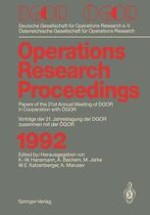1993 | OriginalPaper | Buchkapitel
Markov equilibria in perfect differential games
verfasst von : Alexander Mehlmann
Erschienen in: DGOR / ÖGOR
Verlag: Springer Berlin Heidelberg
Enthalten in: Professional Book Archive
Aktivieren Sie unsere intelligente Suche, um passende Fachinhalte oder Patente zu finden.
Wählen Sie Textabschnitte aus um mit Künstlicher Intelligenz passenden Patente zu finden. powered by
Markieren Sie Textabschnitte, um KI-gestützt weitere passende Inhalte zu finden. powered by
The basic feature shared by the games analyzed in this paper is the subgame perfectness of open-loop equilibria (if they exist). Clemhout and Wan (1974), Leitmann and Schmitendorf (1978), and Reinganum (1982) isolated different classes of such perfect games. The typological connection between their classes of games has been investigated by Mehlmann and Willing (1983), Fershtman (1987) and Mehlmann (1988). The first two types of games are characterized by the structural property of state-redundancy. After replacement of multipliers by the solutions of the corresponding costate equations, the Hamiltonian maximizing conditions ∂H i /∂u i = 0 are independent of the state variables, and the initial state value. The claim implicitly issued by Mehlmann and Willing (1983) is that any perfect game is either state-redundant or can be transformed to a state-redundant game. That state transformations are the main tool of proving the perfectness of a given game has been demonstrated by Fershtman (1987). Denote by ГT;χ 0 a finite horizon differential game starting at the initial state value χ0. Fershtman’s main criterion for the identification of perfect games is the equivalence of ГT;χ 0with ГT;χ for all admissible initial state values χ0 and a fixed value χ. The subgame-perfectness of open-loop equilibria is, however, not the only consequence of equivalence between games posessing identical payoffs and dynamics but starting from different initial states. If this relation is defined by diffeomorphisms then any equilibrium outcome as well as any Pareto efficient outcome generated by a team optimal set of decision rules is necessarily independent of initial state value and corresponding state trajectory. Triggering defined under these circumstances offers a credible alternative to the direct extensions of bargaining schemes to N-person differential games. It may be shown that Pareto efficient outcomes can be implemented as Markovian type equilibria.
